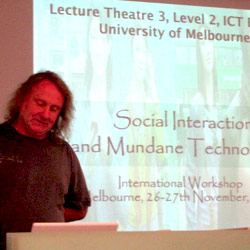Recent Stories
- Businesses urged to tap into science and technology young talent
- Digital relay baton enables remote crowd cheering of athletes
- Health Innovation Campus moves a step closer
- £7.1 million R&D boost for North West businesses
- Centre of excellence created for the next industrial revolution
- Artificial intelligence toolkit spots new child sexual abuse media online
- Strategic partnership set to help plug cyber security skills gap
- What your choice of smartphone says about you
- InfoLabTree: Discover the Story
- novi.digital Launch Event - 'An Event to Help Businesses Grow Online'
RSS Feeds
RSS feeds can deliver the latest InfoLab21 news and events direct to your browser without you having to visit the website.
In most browsers you can click on an RSS link and choose to subscribe to the feed to add it to your favourites or bookmarks.
How 'The Strange' Becomes 'The Ordinary'
 Dr. Mark Rouncefield presenting his research in Melbourne
Dr. Mark Rouncefield presenting his research in Melbourne
A workshop on 'Social Interaction and Mundane Technologies' has been held at Melbourne University.
The workshop, organised by Lancaster University researchers Connor Graham and Dr. Mark Rouncefield (Microsoft European Research Fellow) was sponsored by Microsoft and was unusual in that it looked at how technology has become part of our daily lives.
Dr. Rouncefield explained, "Unlike other workshops which discuss novel technologies that are remote from, and strange to, ordinary people, this is one of the first workshops to consider how quite ordinary, taken for granted, technologies are impacting on how we live our everyday lives."
Attracting researchers from Australian, European and American universities, the workshop was in response to the growing use of 'mundane' and unremarkable technologies and applications including mobile phones, word processing packages and blogging.
Amongst a wide range of topics workshop participants discussed issues involved in the use of electronic tagging for monitoring offenders; how people could use mobile phones to manage the information they gave to others (and coincidentally 'lie' to the boss); the use of video in the search for 'a better life'; how families used photographs as reminders of shared history and family obligations and responsibilities; and how electronic displays could be used to maintain a sense of community in rural districts.
Conor Graham and Dr. Mark Rouncefield are based in the Computing Department in InfoLab21.
For more details including the workshop papers and presentations see the workshop website:
Mon 07 January 2008



